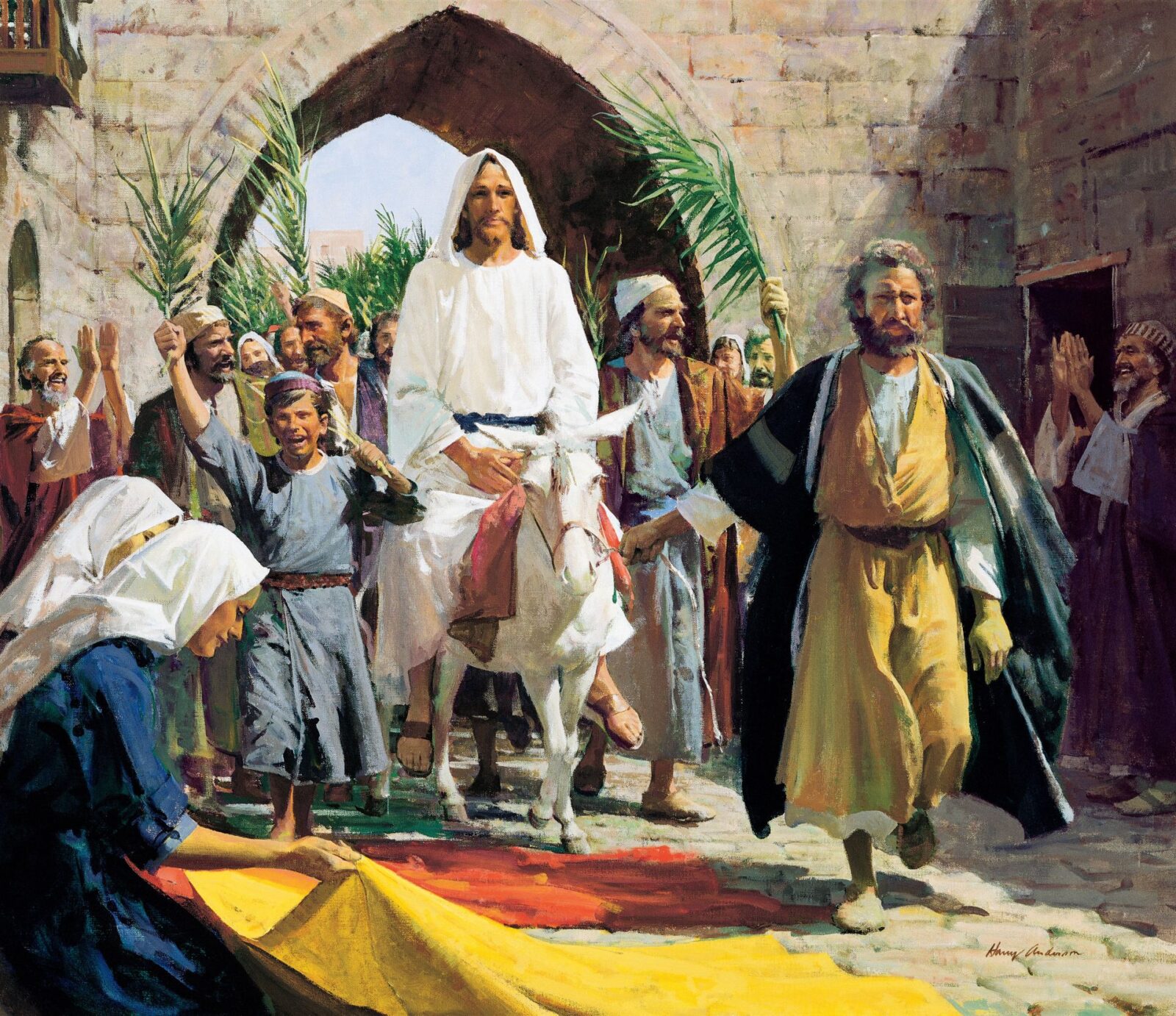To accompany your Come Follow Me study for May 15-21
In addition to reading the indicated chapters, you may wish to:
Read the applicable portions of the New Testament Institute Student Manual at
- Chapter 7: Matthew 19–23 (churchofjesuschrist.org)
- Chapter 14: Mark 11–16 (churchofjesuschrist.org)
- Chapter 19: Luke 18–22 (churchofjesuschrist.org)
- Chapter 25: John 11–13 (churchofjesuschrist.org)
Watch the following related video segments:
- Come Follow Me (May 15–21) Matthew 21-23; Mark 11; Luke 19-20; John 12 | Clean House! at (2) Come Follow Me (May 15–21) Matthew 21-23; Mark 11; Luke 19-20; John 12 | Clean House! – YouTube
- Christ’s Authority is Questioned at Christ’s Authority is Questioned – The Parable of The Two Sons – YouTube
- The Lord’s Triumphal Entry into Jerusalem at The Lord’s Triumphal Entry into Jerusalem – YouTube
- The Gospel According to Matthew (from minute 2:44:02-3:13:10) at https://www.youtube.com/watch?v=woAhReBytBk&t=6494s
- The Gospel of Luke (from minute 2:57:32-3:14:35) at https://www.youtube.com/watch?v=2PHPLApTt7Y
- The Gospel of Mark Visual Bible (from minute 56:00-1:00:18) at https://www.youtube.com/watch?v=BcdgY7V4jZ4&t=1190s
- The Gospel of John (from minute 1:40:50-1:51:00) at https://www.youtube.com/watch?v=kAAZ6HPXdMU
If you would like a Kahoot game related to this material which you could use for personal study or use with your family or your class, click here: https://create.kahoot.it/share/matthew-21-23-mark-11-luke-19-20-john-12/2e6b1742-667b-40f2-9f4b-da3eb8c3c9b2. (To use it with a group, after clicking on this link, you will need to log into Kahoot, creating a free account if you have not done so previously, then click on the blue “Start” button.)
Points to Ponder in Matthew 21-23; Mark 11; Luke 19-20; John 12
1. Why did Jesus, who spoke often of avoiding the chief seats at a banquet, go out of his way to enter Jerusalem in a show of pomp and fanfare?
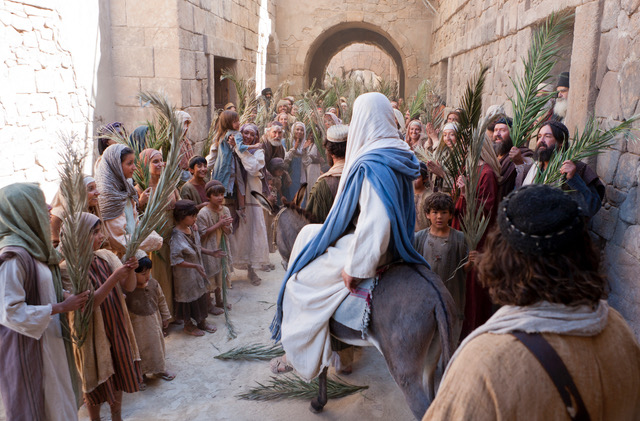
2. How many animals did Jesus use in his triumphal entry into Jerusalem? What difference does it make? (Matthew 21:1ff, Mark 11:1ff, Luke 19:29ff, John 12:14ff.)
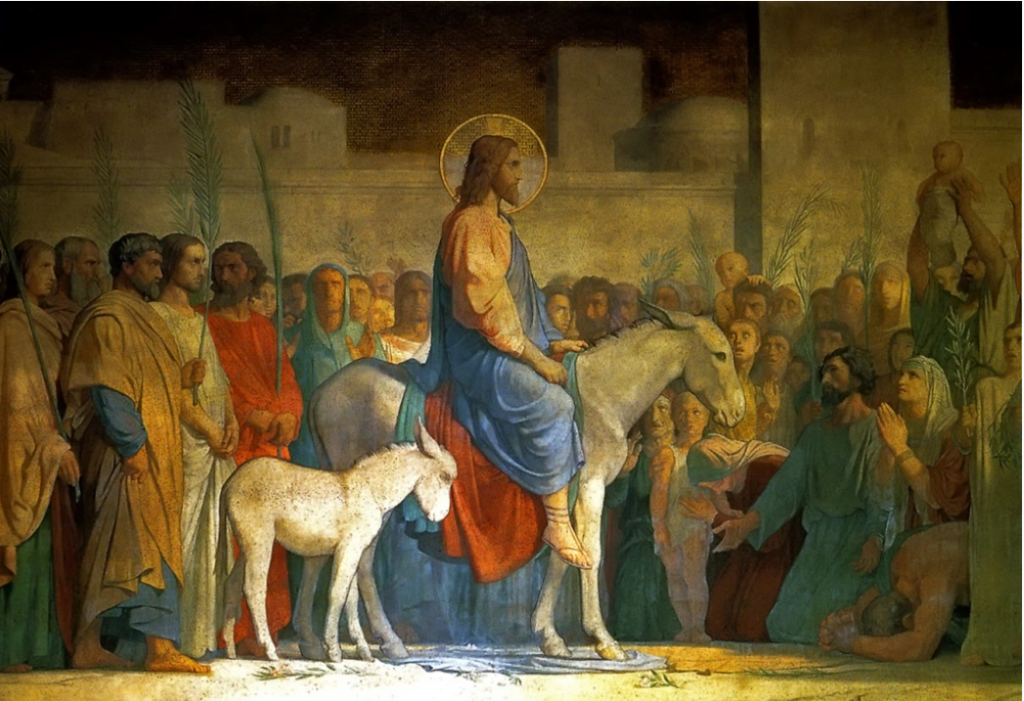
3. What differences can you find between Jesus’ first and second cleansing of the temple? Are they really the same event?
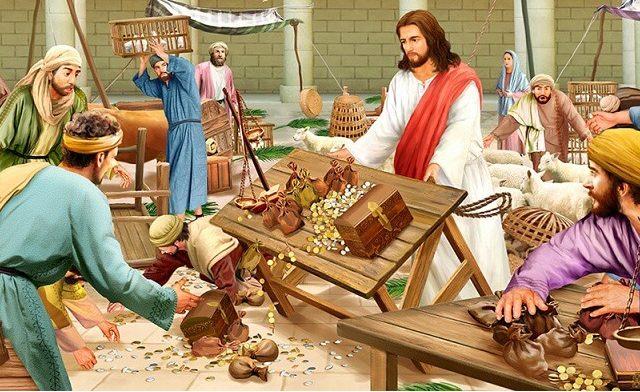
4. Why were there children “crying in the temple”? Where were their parents? Didn’t the chief priests and the scribes have a right to be “sore displeased” at this mark of irreverence? (Matthew 21:15)

5. What was the point of Jesus’ cursing the fig tree? (Matt. 21:19) Did the tree have agency to have prevented its own barren condition?
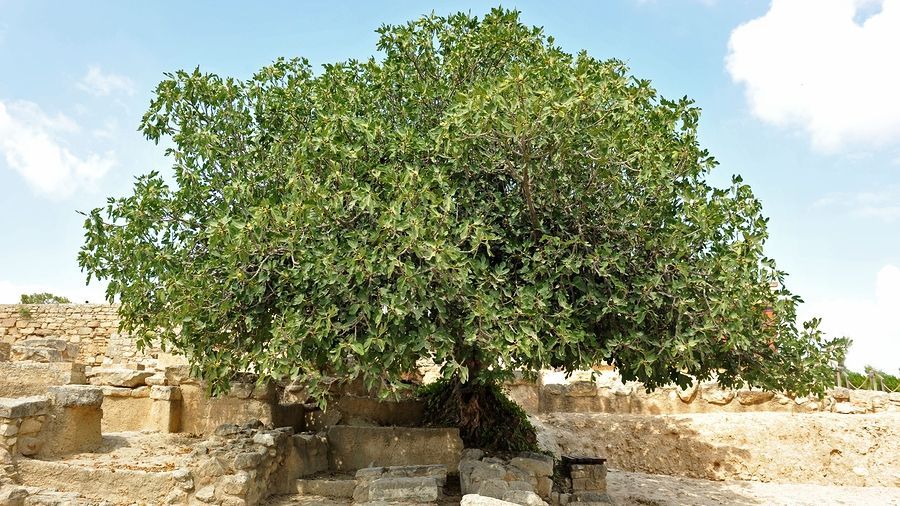
6. Why was Jesus unwilling to answer in Matthew 21:23-27 and Mark 11:33 by what authority he acted?
7. What (a) interpretation and (b) application can you see for the Parable of the Two Sons (Matthew 21:28-32)?
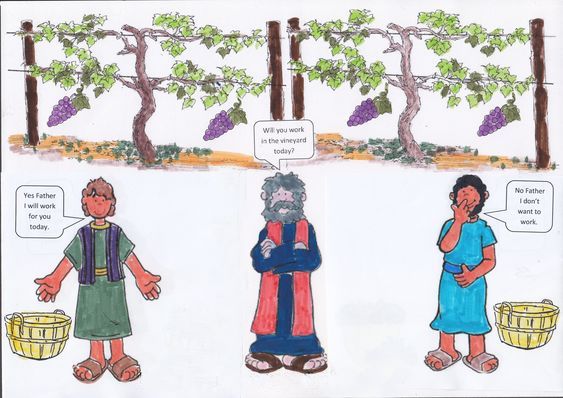
8. Why did Jesus consider publicans and harlots better prospects for the kingdom of heaven than the religious leaders of his day? (Matt. 21:31)

9. Why were the chief priests and Pharisees so offended by Jesus’ telling the Parable of the Wicked Husbandmen?
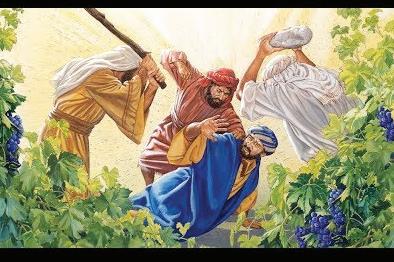
10. What important doctrinal points are made in the Joseph Smith Translation changes in Matthew 21? How can you find out?
11. What similarities and differences do you see between the Parable of the Marriage of the King’s Son (Matt. 22:1-14) and the earlier Parable of the Great Supper (Luke 14:12-24)? How do you account for the differences?
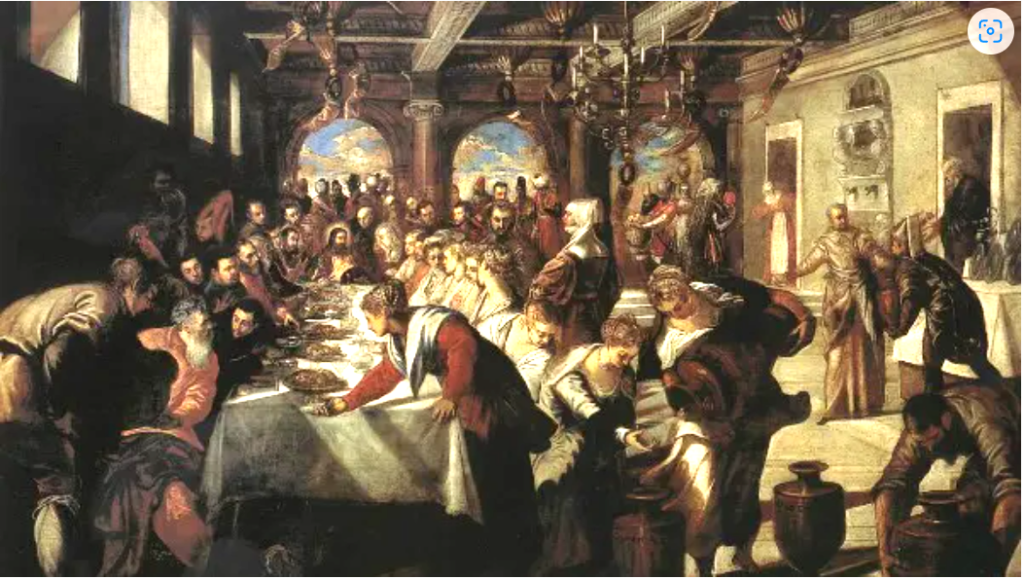
12. Why would Jesus advocate throwing someone out of a wedding feast and casting him into outer darkness just because of how he was dressed? Even BYU doesn’t have that strict a dress code, does it? (Matt. 22:12-13) (See also Rev. 19:8-9 and JST of Matthew 22:14.)

13. What applications do you are feel are appropriate for Jesus’admonition to “render unto Caesar the things which are Caesar’s and unto God the things that are God’s”? Why did Jesus’ listeners consider this such a “marvelous” answer?
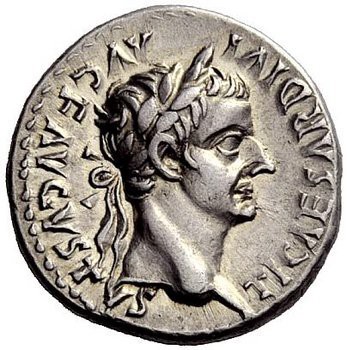
14. Matthew 22:23-30 and Luke 20:27-39 is often quoted to argue that the LDS doctrine of eternal marriage is wrong. How do you explain those verses?
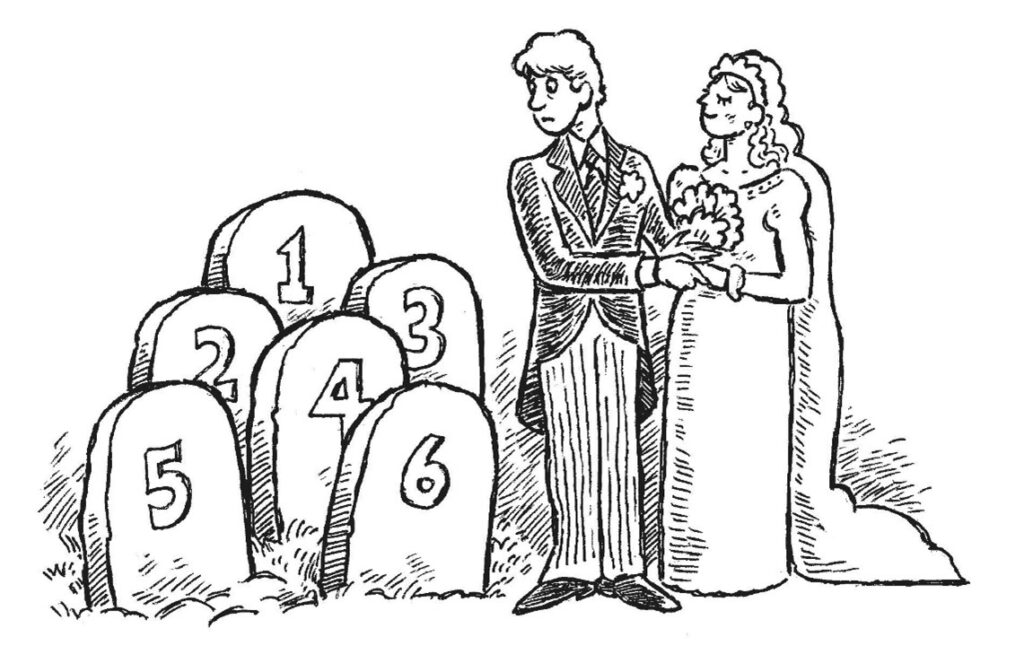
15. Why was Jesus’ answer to the lawyer’s question of which was the greatest commandment so brilliant? (Matthew 22:35-40.)
16. How would you respond to the following comment? “It’s no wonder the scribes and Pharisees didn’t like Jesus. He was sure blunt in Matthew 23:1-39. If he had used more PR skills rather than just call them names, they might have got along better.”
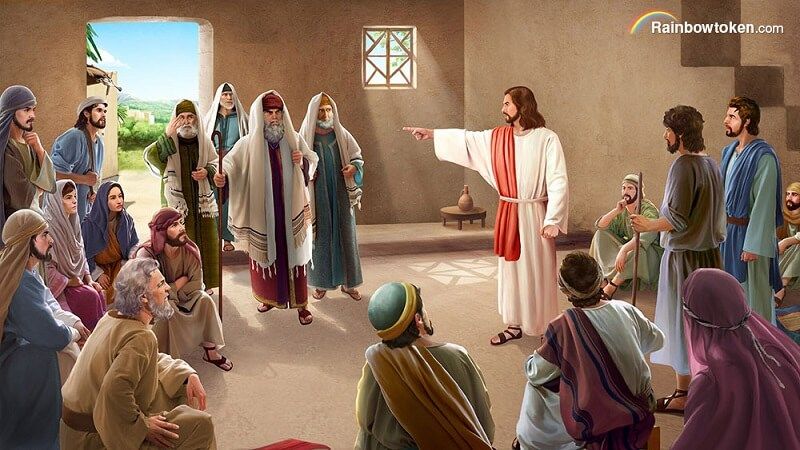
17. How do you feel about Joseph Smith’s comment, “I love that man better who swears a stream as long as my arm yet deals justice to his neighbors and mercifully deals his substance to the poor, than the long, smooth-faced hypocrite.”
18. Do you agree or disagree with the following proposition? “In general, the seriousness of a sin varies inversely with its visibility.”
19. What’s wrong with calling your paternal progenitor your father? What does Jesus intend that we call him, in Matthew 23:9?
20. How did Zacchaeus in Luke 19:1-10 get by with only giving half of his goods to the poor, when Jesus required the young ruler of the preceding chapter to give up everything?
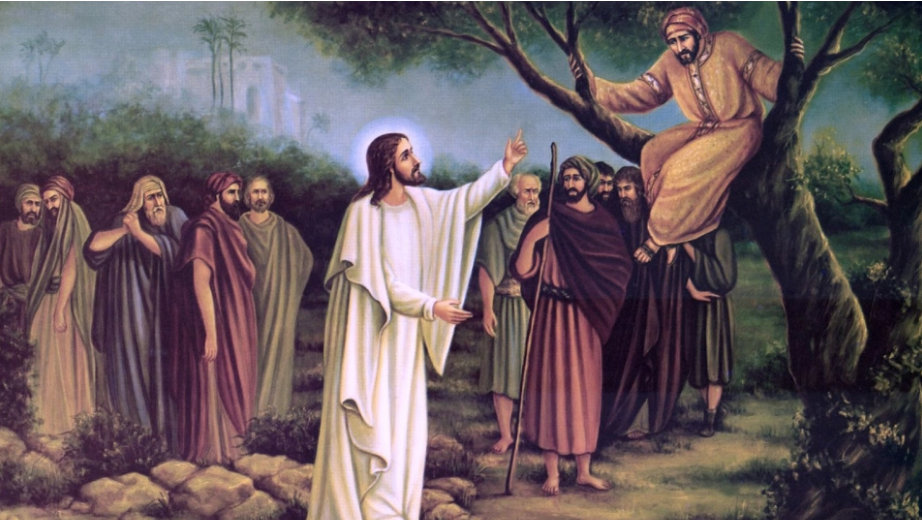
21. Why wouldn’t the reporters let Zacchaeus see Jesus in Luke 19:3? What possible importance does the answer have?

22. How would you summarize the message of the Parable of the Pounds? (Luke 19:12-27.)

23. What modern applications can you see of the story of Jesus’ condoning Mary’s anointing his feet with expensive oil rather than selling it and giving to the poor as Judas would have proposed? (John 12:1-8)
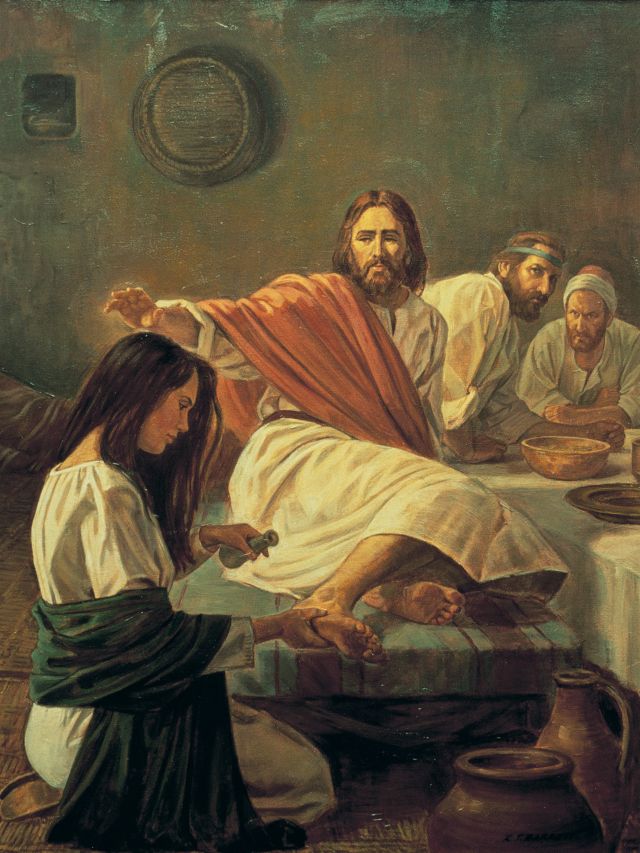
24. What was so unusual and significant about the spiritual experience related in John 12:28?
25. What other passages in these chapters did you personally find most worth marking?
Possible Answers to Points to Ponder in Matthew 21-23; Mark 11; Luke 19-20; John 12
1. Why did Jesus, who spoke often of avoiding the chief seats at a banquet, go out of his way to enter Jerusalem in a show of pomp and fanfare?
It was time for Jesus to make a public and dramatic proclamation of His Messiahship prior to His impending crucifixion, as foretold in Zechariah 9:9-10. The Institute New Testament Student Manual tells us: “In ancient times, the ass was a symbol of Jewish royalty. During the time of the monarchy in ancient Israel, following the enthronement of King Saul, the Jews held annual reenthronement rituals that featured a king riding into Jerusalem upon a donkey…. Thus, at a time when Jerusalem was flooded with Jews, Jesus entered Jerusalem in a manner that demonstrated He was the Messiah, the King of Israel. Riding on a donkey also showed that Jesus came as a peaceful and “lowly” Savior, not as a conqueror upon a warhorse.”
2. How many animals did Jesus use in his triumphal entry into Jerusalem? What difference does it make? (Matthew 21:1ff, Mark 11:1ff, Luke 19:29ff, John 12:14ff.)
Zechariah 9:9 had foretold: “Behold, thy King cometh unto thee: he is just, and having salvation; lowly, and riding upon an ass, and upon a colt the foal of an ass.” Mark, Luke, and John evidently understood that Zechariah was using parallelism to refer twice to the same animal. Each of them accordingly records only one animal used in the triumphal entry. Matthew, however, evidently thought that Zechariah was referring to two different animals and so embellished his account to speak of the ass and the colt as two different creatures. Joseph Smith, in his inspired revision, corrected Matthew’s account to speak of only one animal, in harmony with the other three writers.
The number of animals used is, of course, a comparatively unimportant detail. But it may be worth noting that this is another example of how the Bible is best thought of as true “so far as it is translated correctly” and so far as fallible humans recorded the story correctly in the first place. It thus becomes another validation of the eighth Article of Faith and a reminder of the importance of modern prophets as commentators on the writings of those who came before.
3. What differences can you find between Jesus’ first and second cleansing of the temple? Are they really the same event?
- In the first, He made and used a whip and drove out sheep and oxen. There is no mention of such in the second cleansing.
- In the first, Jewish leaders confronted Him immediately. In the second, the complained a bit at the time but really challenged Him only the following day.
- Only John tells of the first cleansing. Only John fails to record the second instance. Nevertheless, the time difference is so specifically recorded by those recording each event as to make it quite unlikely that these were just different accounts of the same thing.
- On the first occasion, Jesus spoke of the temple of His body and its future destruction and resurrection.
- On the second, He healed the blind and lame.
- On the second, there is mention of “children crying” in the temple.
4. Why were there children “crying in the temple”? Where were their parents? Didn’t the chief priests and the scribes have a right to be “sore displeased” at this mark of irreverence? (Matthew 21:15)
It is clear even from the context that these were not crying babies, as they were “crying … and saying, ‘Hosanna to the Son of David.’” Joseph Smith amended the verse to clarify that these were “children of the kingdom.” Jesus’ reference to Psalms 8:2 concerning “babes and sucklings” in defense of these “crying children” suggests that they may indeed have been youngsters, but they are crying out with joy, not weeping.
5. What was the point of Jesus’ cursing the fig tree? (Matt. 21:19) Did the tree have agency to have prevented its own barren condition?
The fig tree looked like it should have had plenty of fruit on it, as it was full of leaves. Jesus, of course, did not blame the fig tree itself, which bore no moral culpability, but He did take advantage of the ready-made object lesson to make a powerful point about the evils of hypocrisy.
6. Why was Jesus unwilling to answer in Matthew 21:23-27 and Mark 11:33 by what authority he acted?
Since Jesus within a week was to voluntarily submit to scourging and crucifixion, it may seem strange that He so carefully avoided the several traps His enemies tried to lay for Him at this time. Perhaps He was trying to expose the hypocrisy of His questioners. Perhaps He was teaching His disciples ways they could similarly avoid entrapment in the future. Someday we can ask Him!
7. What (a) interpretation and (b) application can you see for the Parable of the Two Sons (Matthew 21:28-32)?
The interpretation is clearly that the first son represented the publicans and harlots, who made no initial pretense of following the Lord, but who in many cases ultimately did so. The second son was the Jewish leaders, who supposedly were committed to doing all God asked of them, but in reality did the opposite.
The parable, of course, has application to each of us. No matter what the defects may have been in our lives up to this point, the door is open for us to repent and enjoy the blessings we have previously missed. But once we have committed ourselves to following the covenant path, we must be careful to keep those commitments.
8. Why did Jesus consider publicans and harlots better prospects for the kingdom of heaven than the religious leaders of his day? (Matt. 21:31)
Where much is given, much is required. The publicans and harlots had made no previous promises to keep God’s commandments, but considerable numbers of them accepted Jesus’ invitation to change their lives. The Jewish leaders, on the other hand, were typically deeply entrenched in their prideful and hypocritical ways and were much less likely to change.
9. Why were the chief priests and Pharisees so offended by Jesus’ telling the Parable of the Wicked Husbandmen?
The wicked husbandmen in the parable clearly represented those chief priests and Pharisees, who were even then plotting to kill God’s Son. As the time for His death grew nearer, Jesus became increasingly specific in His references to the wicked leaders who would take His life.
10. What important doctrinal points are made in the Joseph Smith Translation changes in Matthew 21? How can you find out?
Fortunately, we have the changes shown in the Joseph Smith Translation Appendix in the Study Aids. To me, there are two primary contributions:
First, in JST, Matthew 21:33, we find Jesus saying, “For he that believed not John concerning me, cannot believe me, except he first repent.” This seems to tell us that though we normally think of repentance as following faith, there is a sense in which faith itself is dependent on repentance. It is somewhat circular: When we repent, we qualify for the presence of the Holy Ghost, which brings belief and faith along with it, which in turn promotes further desires for repentance. On the other hand, if one starts with a smidgeon of faith, even a desire to believe, it can motivate him to begin on the path to repentance, which then will result in further faith. It probably doesn’t matter whether one begins with a small desire to believe or a small desire to change his life, provided he acts on those desires and sets the wheel in motion.
The second major contribution of the JST to this chapter, in my opinion, is found in verses 53-56, which clearly speak of the then future conversion of the Gentiles, the latter-day restoration of the gospel, and the eventual Second Coming of the Savior.
11. What similarities and differences do you see between the Parable of the Marriage of the King’s Son (Matt. 22:1-14) and the earlier Parable of the Great Supper (Luke 14:12-24)? How do you account for the differences?
Both parables seem to teach the same message about the invitation to the House of Israel, their rejection of it, and the subsequent invitation to the Gentiles to partake of the feast. The differences seem to be in the intensity of the second parable. Rather than just a rich man putting on a banquet, we have a king hosting a wedding for his son. And rather than just make up silly excuses for not attending, as those invited did in the first parable, those in the second parable kill the king’s representatives, whereupon the king sends his armies to kill the murderers. The second parable also includes the account of the invited guest who attended without the proper dress, which is not mentioned in the first account. The Parable of the Marriage of the King’s Son is told during the final week of the Savior’s life, at a time when He is teaching more plainly and powerfully than ever.
12. Why would Jesus advocate throwing someone out of a wedding feast and casting him into outer darkness just because of how he was dressed? Even BYU doesn’t have that strict a dress code, does it? (Matt. 22:12-13) (See also Rev. 19:8-9 and JST of Matthew 22:14.)
The “wedding garment” is obviously symbolic. We get a clue in Revelation 19:7-8, which tells of the “marriage of the Lamb,” where the bride (representing the faithful saints) is “arrayed in fine linen,” which is symbolic of “the righteousness of saints.” It is also instructive to see the JST version of Matthew 22:14, which reads, “For many are called, but few are chosen,” but then adds, “Wherefore all do not have on the wedding garment.”
13. What applications do you are feel are appropriate for Jesus’admonition to “render unto Caesar the things which are Caesar’s and unto God the things that are God’s”? Why did Jesus’ listeners consider this such a “marvelous” answer?
We learn from Jesus’ answer that:
- We can live the gospel even in a society with a corrupt government.
- It is more important to follow God and build His kingdom than to take a stand against every political injustice we may believe we have discovered. There may be times we will need to be silent about political matters in order to advance the work of the Lord and avoid needlessly giving offence.
- We should pay our taxes, whether or not we agree with all the ways they will be used.
- With care and inspiration we can give answers which will defuse a potentially volatile situation. This is why Jesus’ listeners “marvelled” at His answer. He had avoided the trap of either advocating paying taxes, and thus incurring the wrath of the Jews, or suggesting not paying them, and leaving Himself open to charges of treason against Rome.
14. Matthew 22:23-30 and Luke 20:27-39 is often quoted to argue that the LDS doctrine of eternal marriage is wrong. How do you explain those verses?
First, it is important to recognize that the questioners were trying to trap Jesus into giving answers for which they could charge Him with a capital offense. They were not sincerely seeking theological enlightenment. Jesus accordingly gave a partial answer in order to avoid entrapment.
Secondly, note that the question was posed by a group of Sadducees, “which say that there is no resurrection.” These Sadducees with a straight face claim that “there were with us” seven brethren, each of whom married the same wife in turn. These were clearly not men who were followers of Jesus and who might have taken advantage of the power He wielded and had delegated to His Apostles to seal on earth that which would be sealed in heaven. So, Jesus with an equally straight face honestly tells the Sadducees, regarding this fictitious family of brothers among them, “in the resurrection they neither marry, nor are given in marriage.” This was not the time nor place to elaborate on the fact that others, married by proper authority, could indeed have eternal relationships hereafter.
Finally, the very fact that the Sadducees thought they could entrap Jesus by making Him choose from among the seven brothers which one would have the wife in the hereafter is evidence that the Sadducees understood He had taught about eternal marriage. Otherwise, why even pose the question?
15. Why was Jesus’ answer to the lawyer’s question of which was the greatest commandment so brilliant? (Matthew 22:35-40.)
The lawyer presumably was referring to the Ten Commandments, expecting that Jesus would pick one of them. He likely had his arguments prepared against any expected answer which the Savior might have given. He was evidently unprepared for the fact that Jesus might pick Deuteronomy 6:5 and Leviticus 19:34, which embrace all the other commandments. We are not specifically told that the people marveled at His response, as they did after His other answers, but there is certainly no recorded rebuttal or further complaint from the lawyer. And soon thereafter we are told, “No man was able to answer him a word, neither durst any man from that day forth ask him any more questions.” (Matthew 22:46)
16. How would you respond to the following comment? “It’s no wonder the scribes and Pharisees didn’t like Jesus. He was sure blunt in Matthew 23:1-39. If he had used more PR skills rather than just call them names, they might have got along better.”
Jesus wasn’t trying to convert the scribes and Pharisees. He knew their hearts and their entrenchment in hypocrisy. But He was trying to expose their hypocrisy to His disciples and others who might have an open mind and heart.
17. How do you feel about Joseph Smith’s comment, “I love that man better who swears a stream as long as my arm yet deals justice to his neighbors and mercifully deals his substance to the poor, than the long, smooth-faced hypocrite.”
Your choice. I think Jesus would have agreed!
18. Do you agree or disagree with the following proposition? “In general, the seriousness of a sin varies inversely with its visibility.”
I think there is some truth to that. Nowhere is Jesus recorded as criticizing the harlots and publicans as strongly and directly as He did the hypocritical Pharisees, whose sins were more hidden but more poisonous to the soul. Similarly, D&C 64 tells us that refusal to forgive is a greater sin that whatever was done to us that we won’t forgive. And certainly smoking, drinking, abusing drugs, and skipping church are less serious than the more easily hidden sins of pride, anger, hatred, and hypocrisy of modern Pharisees.
19. What’s wrong with calling your paternal progenitor your father? What does Jesus intend that we call him, in Matthew 23:9?
Once again, the Joseph Smith Translation comes to the rescue. It renders the equivalent verse as: “And call no one your creator upon the earth, or your heavenly Father; for one is your creater and heavenly Father, even he who is in heaven.” So we can feel free to continue to call our earthly parent “father,” “dad,” or any similar equivalent without incurring divine displeasure.
20. How did Zacchaeus in Luke 19:1-10 get by with only giving half of his goods to the poor, when Jesus required the young ruler of the preceding chapter to give up everything?
This is a good reminder that the Lord tailors His revelations and commandments to the unique circumstances of each of His children. The rich young ruler had purportedly kept all the earlier commandments, so the Lord was able to try a big one on him. Zacchaeus, on the other hand, had never before pretended to keep any commandments, and for him the sacrifice he offered to make was a major step forward and fully acceptable to Jesus at that point.
21. Why wouldn’t the reporters let Zacchaeus see Jesus in Luke 19:3? What possible importance does the answer have?
The “press” here means crowd and has nothing to do with reporters. This is just a reminder that looking up the footnotes can be very helpful when we come across a passage that doesn’t make sense to us.
22. How would you summarize the message of the Parable of the Pounds? (Luke 19:12-27.)
The “pounds” here were quantities of money, of course, not weight. This is similar to but not identical to the Parable of the Talents that is coming up. In this case, ten servants were each given one and were expected to manage it on behalf of their master. They did so with varying degrees of success, presumably corresponding to their varying degrees of effort and faithfulness. The message seems to be: “God’s rewards to us will be commensurate with our faithfulness and diligence in His service.”
23. What modern applications can you see of the story of Jesus’ condoning Mary’s anointing his feet with expensive oil rather than selling it and giving to the poor as Judas would have proposed? (John 12:1-8)
The most obvious application to me is the beauty with which we adorn our temples, using funds that some complain might have been donated to relief of the poor. It was not important for Jesus to have His feet anointed with expensive ointment, but it was important for Mary to make that sacrifice. It is similarly important for us today to feel we are offering the best we have to the Lord to make His house lovely and a fitting symbol of His presence, where we can feel His Spirit in rich abundance.
24. What was so unusual and significant about the spiritual experience related in John 12:28?
This is one of the very few occasions in all of scripture where the voice of the Father is heard by mortals. Others include Jesus’ baptism, the Mount of Transfiguration, Nephi in 2 Nephi 31:15, and Joseph Smith’s First Vision. Virtually all other recorded revelation from “God” is delivered by the Son, though as in an important sense, God and the Son are one, we may not need to make too great a point of this.
25. What other passages in these chapters did you personally find most worth marking?
Your choice. My list would include:
- Matthew 21:22: “All things, whatsoever ye shall ask in prayer, believing, ye shall receive.” See also, Mark 11:24.
- Matthew 23:12: “Whosoever shall exalt himself shall be abased; and he that shall humble himself shall be exalted.”
- Matthew 23:23: A reminder that while payment of tithing may not be the very most important of the commandments, it is nevertheless not to be neglected.
- Mark 11:25-26: Highlights the importance of forgiving is we wish to be forgiven.
- Luke 19:10: “The Son of man is come to seek and to save that which was lost.”
- John 12:25: “He that loveth his life shall lose it; and he that hateth his life in this world shall keep it unto life eternal.”
- John 12:43: A reminder that just as there were Pharisees who believed in Jesus but did not publicly admit it, “lest they should be put out of the synagogue: For they loved the praise of men more than the praise of God,” so do we need to avoid the temptation to do the same in business or political circles today.
